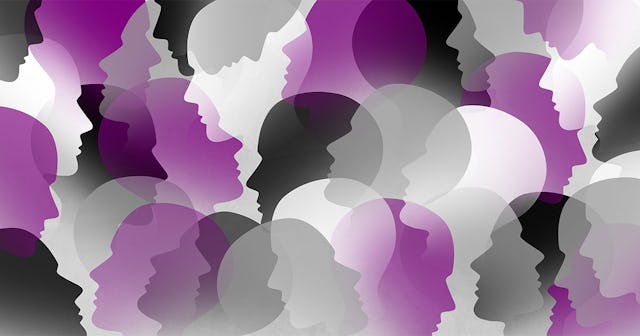I'm Asexual; Here's What That Means

I’ve never been a “sexual being,” and for the vast majority of my life, I didn’t know why. Growing up in a Christian home, the matter wasn’t talked about. There were no conversations surrounding sex. The issue was not discussed. I thought both boys and girls were cute, but I had no desire to act on those thoughts. And when my friends began exploring their bodies — and the bodies of those around them — I locked up. I froze. I did not, and do not, think about (or want to engage in) oral, anal, or vaginal sex acts. I have little to no interest in sex, and what I know now is that I’m asexual.
Of course, I didn’t know I was asexual at 12 or 14 or 17. I married my husband at 23 and still didn’t realize something was different. That I was different. I couldn’t place my finger on why things felt off. And yes, for those wondering, we had sex. A lot. But my heart was rarely in it. I feigned both interest and pleasure. I faked orgasms , and I did so because I loved him and I wanted to bring him happiness and joy.
I thought something was wrong with me. Like many struggling with identity issues, I spent more than a decade trying to “fix” what was broken. Trying to fix me. I tried and tried and tried some more. We explored different positions, fantasies and kinks. And finally, last Summer, I realized the problem wasn’t me, but my perception of how things should be. I was placing pressure on myself to meet society’s expectations of a married woman, and it was weighing me down and making me feel unworthy.
That’s bullshit.
Ironically, my “aha moment” happened in the strangest way. I was out walking, listening to a podcast on identity and queer life — which is something I also identify as. I am a queer woman. The guest on the show was asexual, a label I knew very little about. But as she spoke, I found myself enthralled, captivated by her journey and words, because I could relate. Her experiences were my experiences too. She had no interest in sex. No drive. No desire. This sent me on a journey to learn more.
“Asexual is the lack of sexual attraction to others, or a low interest in sexual activity,” an article on WebMD explains. “Some asexual people actually do have sex. There are many reasons why they might decide to, but two common ones are to please their romantic partner or to have children. Many asexual people have romantic feelings for other people, go on dates, and have long and short-term romantic relationships. They don’t generally have an aversion to sex or depictions of sex — they simply don’t feel sexual attraction.” And asexuality — like most matters — is a spectrum.
“Asexuality is a sexual orientation that lives, like all others, on a spectrum,” an article on Bell Magazine states. “On one end of the spectrum are folks who experience sexual attraction (allosexuals/zedsexuals), and on the other end are folks who simply do not (asexuals).” I fall into the latter category. I find others attractive. I admire their beauty, bodies, attitude, and brains, but I am not physically aroused. There is (quite literally) no reaction. And that’s okay.
I’m okay.
Make no mistake: I’m still coming to terms with my identity. I feel a sense of comfort and relief with this label. It means I am not bad or crazy. I am not alone, and I belong. It means I am not broken. And it means I’m okay; I am now, and I will be.
Being asexual in a committed, heteronormative relationship is hard — especially since this is a revelation I came to late in the proverbial game. My husband and I have been married for 14 years. We have two kids. And I don’t know how this changes things. How this changes us. My husband and I have discussed the matter ad nauseam, but the outcome is still the same. It is full of uncertainties and “I don’t know.” But I’m working with a (new) therapist now to understand my feelings — and to accept myself. I’m working on being confident in my skin. And my husband and I are trying to build intimacy without sex. We are exploring our relationship in a new way.
Will it be sustainable? I don’t know. I truly don’t. But I can’t keep hiding anymore. I can’t keep lying anymore, and I need to accept this is part of who I am: a woman, a writer, a runner, a mother, and queer person. A queer ace.
This article was originally published on